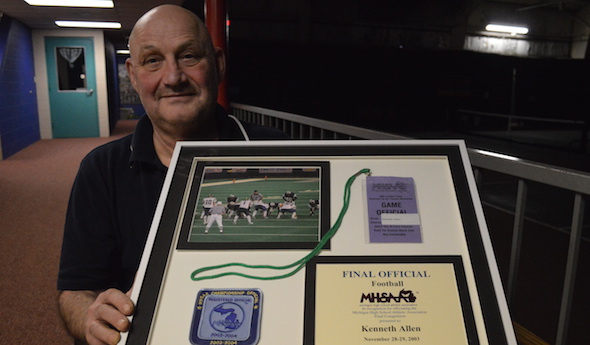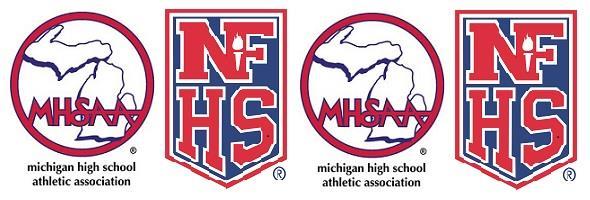
Umpire's Heart Healed, Back in the Game
April 4, 2017
By Mike Spencer
Special for Second Half
Ken Allen can’t wait to say the words “Play Ball!’ today.
Weather permitting, the Traverse City softball umpire is expected to be behind the plate at Kingsley this afternoon after missing all of the spring season last year due to a heart double by-pass surgery.
“I’m sure It’s going to be exciting,” said Allen, a 32-year MHSAA umpire, basketball and football referee. “Especially after taking a year off from softball.
“But once the game gets started and you make that first call, it’s going to be right back to the old business.”
Allen, who has hardly missed a game since Dick Simon recruited him to officiate in 1985, was glad he went to his primary care physician after he noticed he was slowing down at the end of the 2015-16 boys and girls basketball season.
Allen’s doctor did an EKG and referred him to a heart surgeon, where he underwent a cardiac catheterization. Before the visit with the heart specialist was over, Allen was wheeled up to the second floor for heart surgery.
“It changed things, but I keep telling everybody that the man above gave me a second chance and I’m going to take full advantage of it,” said Allen, who was told he’d need at least three months to recuperate. “It was hard to be idle.”
“Ken is an ‘old school’ die hard,” said Barb Beckett, a charter member of the Northern Sports Officials Association, former officiating partner and assignor. “He is an assignor’s dream because he will go anywhere, work any level, and anytime.
“It was tough on him missing the last part of the basketball season and entire softball season. He makes a difference every time he steps on the court or the field."
Allen, who has officiated two MHSAA Finals in softball and another in football, never thought about retiring after his double by-pass on March 3, 2016.
“I never had a thought about quitting, and I don’t have a plan to retire,” Allen said. “I’m going to go as long as I can.
 “When I can’t give the kids a full 100 percent, it’ll be time to get out.”
“When I can’t give the kids a full 100 percent, it’ll be time to get out.”
Allen had a clean bill of health to officiate football last fall, but he missed two weeks of the season after having his gall bladder removed. He then went on to work the entire boys and girls basketball season, which ended last month.
“Ken has always been a very hard-working official, and it’s no surprise to anyone that he has worked so hard to get back on the field and court,” said MHSAA assistant director Mark Uyl, the association’s coordinator of officiating. “Ken always had a true passion for officiating, and this passion has helped him recover and has been a source of motivation to get healthy and rehab so he can return to the competitive arena.”
Uyl said life-threatening illnesses and injuries often send veteran officials into early retirement.
“For many other officials, what Ken endured would have meant retirement or the end of their career, certainly in a sport like basketball,” Uyl said. “It shows how important working with the kids and schools is to Ken that he’s persevered so hard to get back.”
Allen also officiated baseball until the day he lost a coin flip and had to leave his softball game because no one showed up at the baseball field. His softball partner Tom Post tooted his horn departing after two quick softball games and Allen was still in the bottom half of his opener.
Although Allen has officiated two MHSAA softball championship games, football is his No. 1 sport. He worked a 2003 MHSAA Final as the umpire.
“When I first started out, I was on the chains,” said Allen, who played freshman football at Clio High and ran track and cross country. “Then I decided that I wanted to get in the middle where the action is. I really love it.”
Allen’s taken a few knocks in the middle of the football field, even suffered a couple of concussions. But until the heart double by-pass, he was always able to get back up on his feet without hardly missing a down.
“Ken is a great official because he’s got such good people skills,” Uyl said. “The officiating business is a ‘people business’ first and foremost, and this is why this has been such a great fit for Ken for the past 30-plus years. The MHSAA and all member schools are thrilled to have Ken back!”
Author Mike Spencer is a MHSAA registered official in boys and girls basketball and soccer. He spent more than three decades as a newspaperman before becoming a marketing communications specialist two years ago.
PHOTOS: (Top) Ken Allen, a 32-year veteran official from Traverse City, shows off his most memorable moment in high school officiating with photos and items he received after doing a 2003 MHSAA Finals assignment. (Middle) Allen kneels behind the plate; today he’ll return to action for the first time after heart surgery.

Become an Official: HS Sports Need You
January 24, 2018
By Bob Gardner, Executive Director of the National Federation of State High School Associations
and Mark Uyl, Assistant Director of the Michigan High School Athletic Association
They don’t make the headlines, their names are not in the box scores and they don’t make the all-star teams. But perhaps the most important individuals in high school sports are the contest officials.
These individuals are so important that, in fact, there would be no organized competitive sports at the high school level without the men and women who officiate these contests every day across the country. Subtract the dedicated men and women who officiate high school sports, and competitive sports would no longer be organized; they would be chaotic.
In some areas of our country, high school officials are retiring faster than new ones are being added. And junior varsity, freshmen and middle school games are being postponed – or even cancelled – because there are not enough men and women to officiate them.
Anyone looking for a unique way to contribute to the local community should consider becoming a registered high school official. For individuals who played sports in high school, officiating is a great way to stay close to the sport after their playing days have ended. Officiating helps people stay in shape, expands their social and professional networks and offers part-time work that is flexible, yet pays. In fact, officiating is a form of community service, but with compensation.
Another benefit of officiating is that individuals become role models so that teenagers in the community can learn the life lessons that high school sports teach. Students learn to respect their opponents and the rules of the game and the importance of practicing good sportsmanship thanks, in part, to those men and women who officiate. And the objectivity and integrity that high school officials display is an example that every young person needs to observe firsthand. In short, communities around the country will be stronger because of the life lessons that high school officials help teach the next generation.
Officiating is a great way to stay connected to sports and to give back to the local high school and community. We need dedicated men and women to become involved so that high school sports can continue to prosper for years to come.
Individuals interested in learning more about becoming a high school official, and even beginning the application process, can do so at www.HighSchoolOfficials.com.

